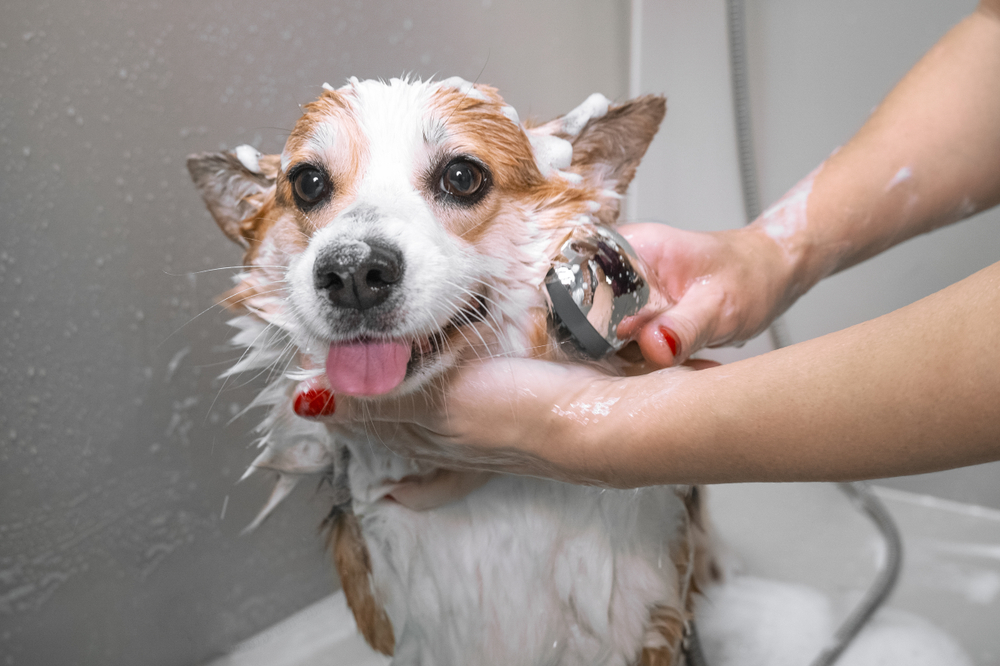Jingle-jingle.
No, it’s not Christmas in July. And you are not hearing sleigh bells in the middle of summer—it’s your pet’s collar tags jingle-jangling as your pet scratches all day, and night. ’Tis the season for environmental allergies—and these frustrating airborne substances that cause us to sniffle, sneeze and cough commonly give our pets the gift of itchy and irritated skin.
Help your pet find comfort this season—and maybe a little joy, too—with this seasonal allergy guide from North Waterloo Veterinary Hospital.
What is a pet allergy?
In a general sense, allergies are the immune system’s response to a particular substance (i.e., allergen). While initial encounters with this allergen may have been harmless (i.e., benign), over time the body can become sensitized, resulting in an abnormally dramatic reaction—as if the allergen were a dangerous health threat rather than mere pollen or mold.
What environmental allergens affect pets?
Pets and humans share many of the same inhaled seasonal allergens, including:
- Tree pollen (e.g., ash, oak, cedar)
- Grass pollens
- Weeds (e.g., ragweed, pigweed)
What are seasonal allergy signs in pets?
Pets with seasonal allergies typically show cyclical signs that increase during the spring and summer and subside during the fall and winter. Seasonal allergies usually begin when pets are young, between 6 months and 2 years of age. Common signs include:
- Intense itching
- Excessive scratching, biting, or licking
- Skin irritation
- Hair loss
- Crusty skin lesions
- Facial rubbing
- Restlessness
- Sneezing
- Coughing
- Watery eyes
Seasonal allergies make pets miserable and can negatively impact their quality of life. Left untreated, skin irritations can lead to secondary bacterial infections, moist dermatitis (i.e., hot spots), and ulcerated wounds. If you suspect your pet is affected by seasonal allergies, schedule an appointment at North Waterloo Veterinary Hospital.
How are seasonal allergies diagnosed in pets?
Seasonal allergy diagnosis is frequently based on your pet’s clinical signs. Your pet’s veterinarian will conduct a thorough nose-to-tail examination to assess your pet’s overall health and to look for classic allergy signs. If they suspect a secondary skin infection, the veterinarian will recommend diagnostic testing, including a microscopic cytology and a bacterial culture.
In extreme cases, pets may be referred to a veterinary dermatologist for more specific testing and treatment to determine each allergen’s exact identity. Specialist consultations often include:
- Allergy testing — Tiny allergen samples are injected under the skin to check for a reaction.
- Customized allergy injections — Based on allergy testing results, a customized treatment plan can be created to gradually desensitize the immune system, and reduce or eliminate the pet’s natural reaction to the allergen.
What treatments are available for seasonal allergies in pets?
Fortunately, most seasonally allergic pets can be successfully managed without extensive testing and treatment. Many modern therapies provide safe, rapid, and effective relief for itchy pets, and often are combined to create a holistic effect, rather than addressing only the signs. Our seasonal allergy treatment goals include:
- Alleviating discomfort
- Stopping the itch cycle
- Treating infection
- Reducing allergen exposure
To meet these goals, allergy treatments at North Waterloo Veterinary Hospital include:
- Apoquel — Apoquel is a daily oral medication that works on a cellular level by blocking the impulse to scratch and reducing inflammation. Apoquel works in as little as four hours and is a safe and effective alternative to steroids.
- Cytopoint injection — Cytopoint is a long-acting (i.e., four to eight weeks) injection for dogs that targets and blocks the signal that causes their itch. Eliminating the need to scratch allows irritated skin to heal.
- Atopica — This daily oral liquid medication can reduce symptoms and improve comfort for seasonally allergic cats.
- Corticosteroids — Although steroids (e.g., prednisone, prednisolone, cyclosporine) have fallen out of favor because of their side effects, a prescription short course can provide rapid relief for extremely uncomfortable pets.
- Topical products — Medicated shampoos, sprays, and wipes remove itch-inducing allergens, fungi, and bacteria on the skin, thereby reducing exposure.
Can seasonal allergies in pets be cured?

Seasonal allergies cannot be cured, but they can be successfully managed with care from the North Waterloo Veterinary Hospital team. We will combine your pet’s specific treatment plan with additional strategies to reduce your pet’s exposure and boost their immune health during peak allergy seasons. Successful methods include:
- Regular bathing — Pet hair is a magnet for airborne allergens. Cleansing the skin and coat can reduce contact opportunities and keep the skin barrier healthy.
- Foot protection — For pets who suffer with itchy, irritated feet, consider wiping all four feet with a medicated wipe before your pet comes indoors. For prolonged outdoor exposure, such as long walks or hikes, protective dog boots are an excellent allergen barrier.
- Omega-3 fatty acids — Essential fatty acids, such as those found in fish oil, nourish and fortify the skin and coat, and have a natural anti-inflammatory effect.
Give your pet the gift of relief this allergy season
Say bah-humbug to seasonal allergies this summer and give your pet the gift they’ve been scratching for—a trip to North Waterloo Veterinary Hospital for some much needed relief. If you have additional questions about seasonal allergies in pets, or to schedule an appointment, contact our caring team at 519-669-2901, or fill out our online appointment request form.







Leave A Comment